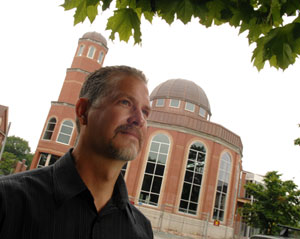 |
| Dalhousie's Chris Helland poses by the new Halifax mosque and community centre on Chebucto Road. " in Canada, people are very accepting overall," he says. (Danny Abriel Photo) |
A Dalhousie researcher is at the heart of an extensive seven-year study that will examine the contours of religious diversity in Canada.
Based at the University of Ottawa, the Religion and Diversity Project will involve 36 team members from 24 international universities, including Dal's Chris Helland.
The project sets out to tackle four broad questions:
- How are religious identities constructed socially?
- How is religious expression defined and delimited in law and public policy?
- How and why do gender and sexuality act as flashpoints in debates on religious freedom?
- What are alternative strategies for managing religious diversity?
"The goal of the project is to identify Canada's religious mosaic," points out Dr. Helland. "We're trying to figure out what is really going on."
Dr. Helland is co-investigator in the stream on media and representation – looking at everything from how textbooks are designed to looking at how the largest religions are portrayed in the media and how that portrayal influences people's perceptions of those different religions and cultures. His group will also be looking at tracking all news stories that appear in Canada on religion, how individual groups respond and how they utilize their official web sites to represent themselves on the web to the public.
Many of the world's leading religious scholars are involved in the project, which got its official kick-off at the University of Ottawa earlier this year led by U of O researchers Laurie Beaman and Peter Beyer.
Canada a baseline
The examination of religion focuses on Canada. While there will be some comparative analysis, Canada is the "baseline" due to this county's relative open mindedness to religious issues.
"It would be very hard to do a project like this in the U.S. where these issues are very polarized," says Dr. Helland. Even in other countries, religious polarization can create a challenging environment to study the topic.
Dr. Helland points out that Canadians are more tolerant and accommodating on religious issues, despite occasional flare ups like the proposed banning of the headscarf in Quebec. "But in Canada, people are very accepting overall. This makes it a unique playing field for this kind of research project."
The decision to research within Canada also makes sense given the rapid demographic changes the country is experiencing. Recent StatsCan numbers show massive shifts in identification of faith in Canada. For example, Hinduism and Islam are showing massive increases based on immigration and birthrate.
Collaboration
"I don't think people realize how quickly demographics can change," suggests Dr. Helland. "The look of our country is changing quickly and significantly and how does that then work in the legal system? How does that work in the school system? How does that work in the street? Just trying to figure out how to make this sort of ‘deep equality’ (not just superficial) in society is a huge challenge in itself."
The Religion and Diversity Project is a "major collaborative research initiative" (MCRI) that wasn't always smooth sailing. Dr. Helland points out that feedback wasn't entirely positive when the project was first presented to Social Sciences and Humanities Research Council (SSHRC) in 2008 but the following year the project was ranked the number-one research project in contention and secured $2.5 million. That funding will allow the researchers to engage in truly meaningful collaborative work.
"There's money for graduate students so I just need to find some graduate students who will want to work on this stuff but for the most part it's just to get people collaborating," says Dr. Helland. "And that's amazing because I don't really get to collaborate as the only religion guy in (the Department of) Sociology and Social Anthropology, so it's a really neat experience for me."
LINK: www.religionanddiversity.ca
